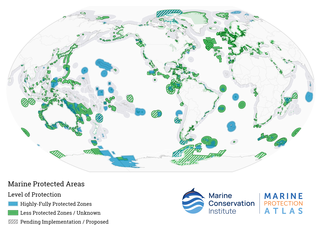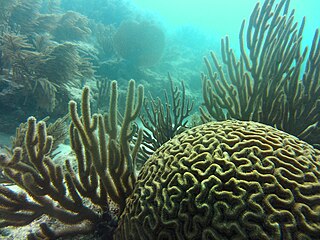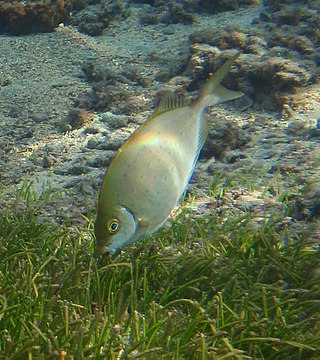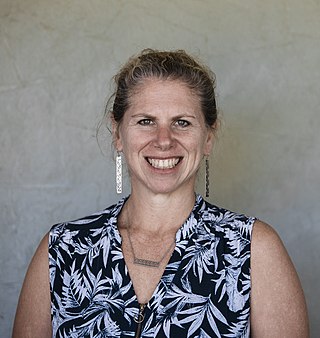Related Research Articles

Marine protected areas (MPAs) are protected areas of the world's seas, oceans, estuaries or in the US, the Great Lakes. These marine areas can come in many forms ranging from wildlife refuges to research facilities. MPAs restrict human activity for a conservation purpose, typically to protect natural or cultural resources. Such marine resources are protected by local, state, territorial, native, regional, national, or international authorities and differ substantially among and between nations. This variation includes different limitations on development, fishing practices, fishing seasons and catch limits, moorings and bans on removing or disrupting marine life. In some situations, MPAs also provide revenue for countries, potentially equal to the income that they would have if they were to grant companies permissions to fish. The value of MPA to mobile species is unknown.

Diadema is a genus of sea urchins of the family Diadematidae.

The orange-lined triggerfish is a demersal triggerfish. Although Balistapus is a monotypic genus, it is closely related to the genus Balistoides.
Janet Patricia Gibson is a biologist and zoologist from Belize. She was awarded the Goldman Environmental Prize in 1990 for her efforts on conservation of the marine ecosystems along the Belizean coast, in particular the barrier reef system. The Belize Barrier Reef was granted UNESCO World Heritage status in 1996, through efforts of Gibson and others. She is the current director of the Belize Wildlife Conservation Society.

The Florida Reef is the only living coral barrier reef in the continental United States. It lies a few miles seaward of the Florida Keys, is about 4 miles wide and extends 270 km (170 mi) from Fowey Rocks just east of Soldier Key to just south of the Marquesas Keys. The system encompasses more than 6,000 individual reefs. Florida waters are home to over 500 marine fish and mammal species along with more than 45 species of stony corals and 35 species of octocorals.
Nancy Knowlton is a coral reef biologist and a former Sant Chair for Marine Science at the Smithsonian National Museum of Natural History.

Echinometra mathaei, the burrowing urchin, is a species of sea urchin in the family Echinometridae. It occurs in shallow waters in the Indo-Pacific region. The type locality is Mauritius.
The resilience of coral reefs is the biological ability of coral reefs to recover from natural and anthropogenic disturbances such as storms and bleaching episodes. Resilience refers to the ability of biological or social systems to overcome pressures and stresses by maintaining key functions through resisting or adapting to change. Reef resistance measures how well coral reefs tolerate changes in ocean chemistry, sea level, and sea surface temperature. Reef resistance and resilience are important factors in coral reef recovery from the effects of ocean acidification. Natural reef resilience can be used as a recovery model for coral reefs and an opportunity for management in marine protected areas (MPAs).

Siderastrea siderea, commonly known as massive starlet coral or round starlet coral, is a stony coral in the family Siderastreidae. It is found in shallow parts of the western Atlantic Ocean as solid boulder-shaped or domed structures.

Siderastrea radians, also known as the lesser starlet coral or the shallow-water starlet coral, is a stony coral in the family Siderastreidae. It is found in shallow parts of the western Atlantic Ocean as small, solid mounds or encrusting sheets.

Pseudodiploria strigosa, the symmetrical brain coral, is a colonial species of stony coral in the family Mussidae. It occurs on reefs in shallow water in the West Atlantic Ocean and Caribbean Sea. It grows slowly and lives to a great age.
Timothy R. McClanahan is a biologist and a senior conservation zoologist at the Wildlife Conservation Society (WCS) and is known for his work on the ecology of coral reefs. He lives and works in Mombasa, Kenya, where he studies the marine tropical ecosystems of the western Indian Ocean, and is the director of the WCS coral reefs program for eastern Africa.

Isabelle M. Côté is a professor of marine ecology at Simon Fraser University in Canada.

Western Indian Ocean Marine Science Association (WIOMSA) is a regional professional, non-governmental, non-profit, membership organization, registered in Zanzibar, Tanzania. The organization is dedicated to promoting the educational, scientific and technological development of all aspects of marine sciences throughout the region of Western Indian Ocean (Somalia, Kenya, Tanzania, Mozambique, South Africa, Comoros, Madagascar, Seychelles, Mauritius, Réunion (France)), with a view toward sustaining the use and conservation of its marine resources. The association has about 1000 individual members as well as about 50 institutional members from within and outside the region.

Siganus sutor, the shoemaker spinefoot rabbitfish ,whitespotted rabbitfish or African whitespotted rabbitfish, is a species of marine ray-finned fish, a rabbitfish belonging to the family Siganidae. It lives in Indo-Pacific coral reefs. It is endemic to the Indian Ocean, from Indonesia to Comoros. S. sutor is one of the commercial marine fishes, which is ubiquitously caught, in Tanzania and the entire East African coast of the Indian Ocean. S. sutor is among the most common fish species in the marine fisheries of Kenya, and accounts for around 40% of the artisanal fishery landings. Various fishing gears are used to target the siganids, but basket traps are the preferred ones. It is one of the mangrove/seagrass-associated coral reef fishes. This species inhabits littoral areas and its fin spines are venomous to humans.

Stacy Jupiter is a marine scientist from Suva, Fiji. She won the MacArthur Fellowship in 2019. According to Newsday, she was the only "overseas" fellow recognized in 2019. Her research focuses primarily on working with the practices of local communities to develop effective strategies that conserve and protect the coastal systems. She performs her work primarily in Melanesia, a Pacific region including Fiji, Solomon Islands, and Papua New Guinea.

Delagoa is a marine ecoregion along the eastern coast of Africa. It extends along the coast of Mozambique and South Africa from the Bazaruto Archipelago to Lake St. Lucia in South Africa in South Africa's Kwazulu-Natal province. It adjoins the Bight of Sofala/Swamp Coast ecoregion to the north, and the Natal ecoregion to the south. It has Africa's southernmost tropical coral reefs and mangrove forests. It is the southernmost Indo-Pacific ecoregion, marking the transition from the tropical Indo-Pacific to Temperate Southern Africa.
The Northern Monsoon Current coast is a marine ecoregion along the eastern coast of Africa. It extends along a portion of the coasts of Somalia and Kenya, from south of Lamu in Kenya to north of Mogadishu in Somalia. It adjoins the Central Somali coast ecoregion to the north, and the East African coral coast ecoregion to the south.
Christina Chemtai Hicks is a British Kenyan environmental social scientist who is a Professor in the Political Ecology group at Lancaster University. She is interested in the relationships between individuals, societies and nature. She was awarded the 2019 Philip Leverhulme Prize for Geography.
Joan Ann ("Joanie") Kleypas is a marine scientist known for her work on the impact of ocean acidification and climate change on coral reefs, and for advancing solutions to environmental problems caused by climate change.
References
- 1 2 "Taking care of ocean habitats". The East African. Retrieved 2020-07-04.
- ↑ "Wildlife Discovery Series". Paul Gauguin Cruises. Retrieved 2020-07-04.
- ↑ Muthiga, Nyawira A (1984). The effects of salinity stress on the respiration and photosynthesis of the hermatypic coral Siderastrea siderea (Thesis). OCLC 11880436.
- 1 2 "Nyawira Muthiga". WIOMSA. Retrieved 2020-07-04.
- ↑ "Honoring the Women Who Fight for Our Ocean (Part 3)". Ocean Conservancy. 2014-03-31. Retrieved 2020-07-04.
- ↑ "Nyawira Muthiga". The Ocean Foundation. Retrieved 2020-07-04.
- ↑ "Expedition Madagascar: Conserving Coral Reefs with Community Conservation". National Geographic Society Newsroom. 2015-06-12. Retrieved 2020-07-04.
- 1 2 3 "ACE AWARD 2018 NOMINEE". Wildscapes Foundation. 2018.
- ↑ "Staff". global.wcs.org. Retrieved 2020-07-04.
- ↑ "Coral - WCS.org". www.wcs.org. Retrieved 2020-07-04.
- ↑ "Integrating social and ecological science for effective coral reef conservation: Marine scientists implement a social-ecological systems framework in 85 communities across four countries". ScienceDaily. Retrieved 2020-07-04.
- ↑ "Triggerfish needed to grow reefs, new research finds". phys.org. Retrieved 2020-07-04.
- 1 2 "ECO ECO-SI Coral Reefs 2020 Page 12". digital.ecomagazine.com. Retrieved 2020-07-04.
- ↑ Gitaa, Tom (2005-12-01). "National Geographic Society Honors Kenyan Marine Conservationist". Mshale. Retrieved 2020-07-04.
- ↑ "Awards & Honors Recipients". International Coral Reef Society. Retrieved 2020-07-04.
- ↑ "Tim McClanahan works to save coral reefs using the language of science". American Association for the Advancement of Science. Retrieved 2020-07-04.